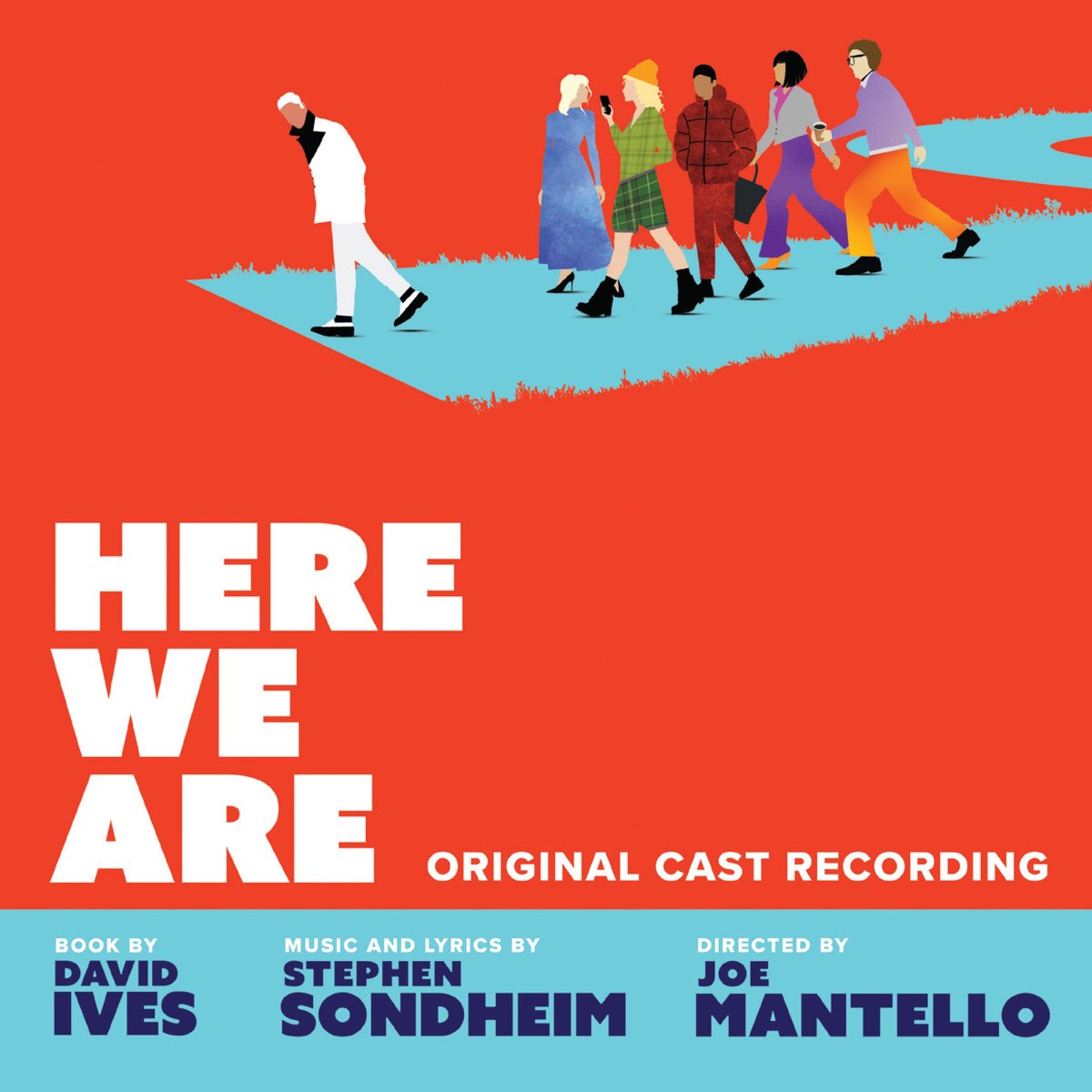Francois Battiste, Tracie Bennett, Bobby Cannavale, Micaela Diamond, Amber Gray, Jin Ha, Rachel Bay Jones, Denis O’Hare, Steven Pasquale, David Hyde Pierce, Jeremy Shamos
Music & Lyrics: Stephen Sondheim
Book: David Ives
Orchestrations: Jonathan Tunick and Alexander Gemignani
Concord Theatricals Recordings
B0CZ2R4KF8
It seems fitting that composer and Lyricist Stephen Sondheim, a lifelong puzzle enthusiast, should leave the world with a final enigmatic work of musical theatre. Here We Are was the musical that the composer had been working on toward the end of his life and, it seems, a performable work had been reached by the time he died at the age of 91.
The musical is based on two films by Spanish-Mexican filmmaker Luis Buñuel: The Discrete Charm of the Bourgeoisie and The Exterminating Angel. Buñuel’s style had progressed from the scandalising razor blade-through-eyeball opening of his first surrealist collaboration with Salvador Dalí Un Chien Andalou to a more absurdist style with pointed political commentary. It is to the latter style that Here We Are is more akin. To those for whom Sondheim never quite became as theatrically radical as he might have done, this final work might actually present a challenge, as it features some of the composer’s boldest work that I can ever recall having encountered. Most notable of these is the more or less through-scoring (either with songs or accompanying orchestral writing) of the first act, boasting perhaps the most advanced utilisation of speech-to-song crossover that Sondheim ever produced, countered with a second act in which music becomes noticeable by its near-total absence.

The absurdist plot revolves around a group of fairly wealthy individuals (though one has renounced her wealth and joined with a group of political radicals) who head out for brunch together, only to encounter a series of truly bizarre obstacles. The first restaurant, for instance, has completely run out of food and drink and the waiter is so distressed about it that he shoots himself. The unfolding events are illogical, but seem to be accepted by the characters, save for Fritz, the political radical, who consistently warns about an impending “end of the world”.
In the second act, the characters find food and drink in the embassy of a fictitious country (from which one of the characters has come), but then find themselves mysteriously unable to leave the room in which they have dined, while food and water supplies become depleted.
As is quite common with Sondheim’s music, on first listen, what you might be left with is a sense of rhythm and melodic fragments, rather than a song you can instantly recall, though on repeated listens, I guarantee you’ll start humming along quite quickly! The first act is well stocked with mostly quite comical songs, though as the action unfolds, a certain level of darkness begins to assert itself. There is a level of pathos in the number It Is What It Is, sung by a restaurant proprietress, mourning the death of her husband. More darkness still arises when a character recounts a dream in which the scene he is involved in has already played out except that he was an actor on stage, unable to recall his lines (The Soldier’s Dream). At the start of the second act, there is a really super number in which a character sings the praises of superficiality (Shine), which I’m sure could easily enter into the pantheon of Sondheim songs that finds a life beyond the show.
The boldness of the move to then remove songs from the remainder of the show seems to have been in the composer’s mind for some time, who noted that the film it is based on uses music very sparingly. In this case, David Hyde Pierce’s priest character notes that “the piano has died” and that he can’t make it play a single note. The band does still have some subtly underscoring in the remainder of the show, so it is not without music, but it just goes to show that even in his final musical Sondheim was prepared to be very daring indeed.
There is a sense in which I can imagine this being more effective on stage, but the cast all produce a compelling rendition of the songs and selected dialogues on this CD. The occasional downside is how closely mic’d the singers are, resulting in some rather shouty sections, to the detriment of the subtleties of the music and texts and I imagine it would be quite a different experience on stage. Of the cast, Rachel Bay Jones appropriately “shines” in her role as Marianne, whose superficiality masks a rather poetic soul, while her husband Leo is portrayed with appropriate gruffness by Bobby Canavale, playing off each other brilliantly. David Hyde Pierce is a fantastically campy priest, but his outwardly comic character belies a conflicted inner-life, with which Pierce is able to portray to most touching effect. Despite my qualms about the “shoutier” moments (which I’m willing to concede is just a hazard of studio recordings), both Micaela Diamond and Amber Gray are wonderfully characterful as Fritz and Claudia, as indeed are the rest of the cast.
Here We Are is probably not destined to enter the central canon of Sondheim’s “greatest” works, but it does show just how willing to experiment he was right up to the end, thus paving the way for future creators of more inventive musical theatre works. It would be good to see the work staged in the UK and have more opportunities to really appraise it as a theatre piece, but the album really does succeed in conjuring the joyously illogical worlds of the show through your speakers and lovers of Sondheim’s work, do not hesitate to experience the fun of this show!
DA

Leave a Comment
I hope you enjoyed this post. If you would like to, please leave a comment below.